Unilever's Operation and Project Management: Analysis and Review
VerifiedAdded on 2023/06/12
|17
|5351
|54
Report
AI Summary
This report provides an in-depth analysis of operation and project management practices at Unilever. It begins by introducing Unilever as a global consumer goods company and then differentiates between operation and operations management, highlighting the importance of effective resource utilization. The report examines the implementation of operations management principles within Unilever, emphasizing reality, organization, fundamentals, accountability, causality, managed passion, and humility. It assesses how well Unilever's operations management meets organizational requirements, focusing on improving product quality, customer satisfaction, revenue increase, competitive advantage, and compliance. The report discusses continuous improvement as a philosophy, describing lean principles such as defining value, mapping the value stream, creating flow, establishing pull, and pursuing perfection. It also includes a continuous improvement plan with justified recommendations. Furthermore, the report analyzes the project life cycle (PLC) stages applicable to a selected Unilever project, reviews project methodologies and tools used, and critically evaluates the effectiveness of the PLC using relevant theories, models, and concepts. The report concludes by summarizing the key findings and their implications for Unilever's operational and project management strategies.
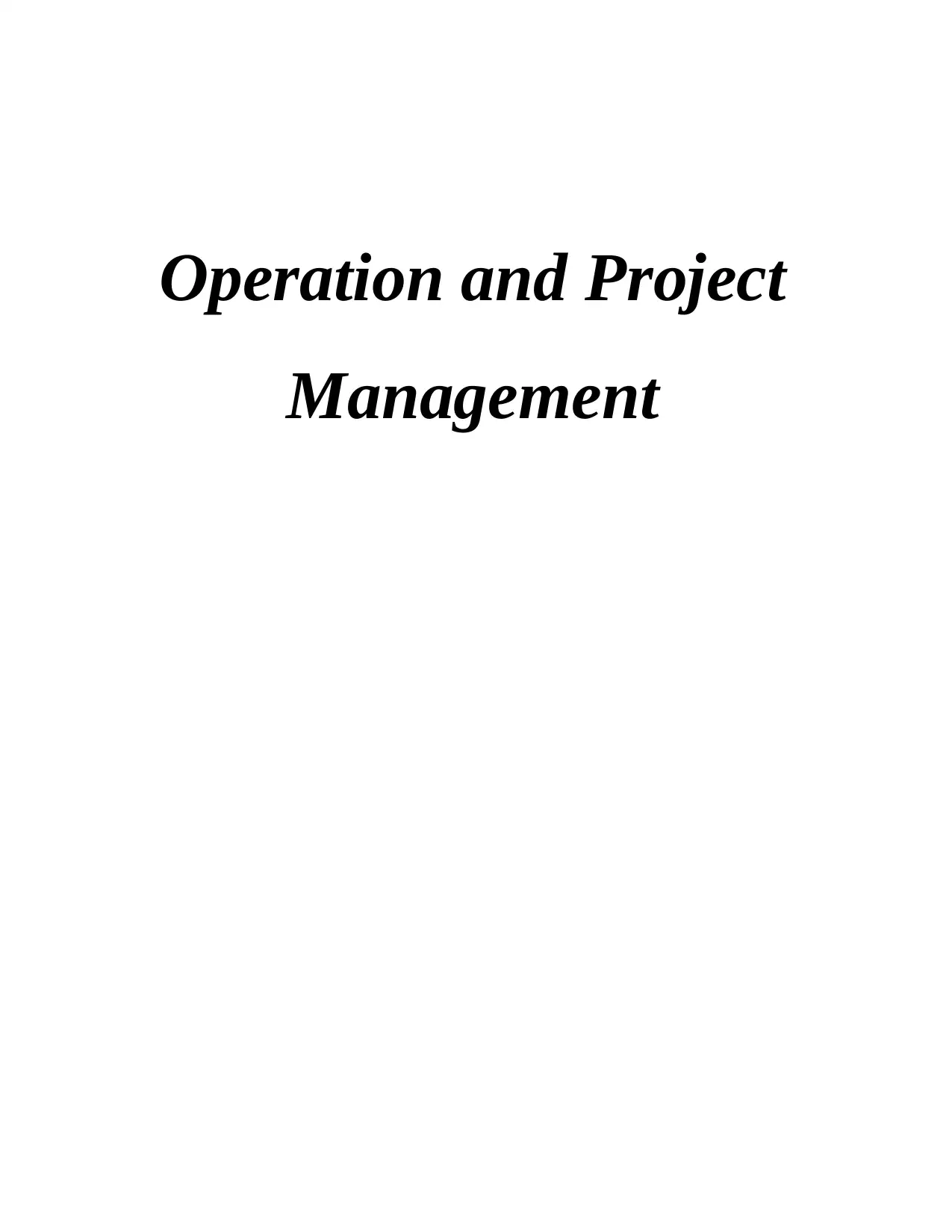
Operation and Project
Management
Management
Paraphrase This Document
Need a fresh take? Get an instant paraphrase of this document with our AI Paraphraser
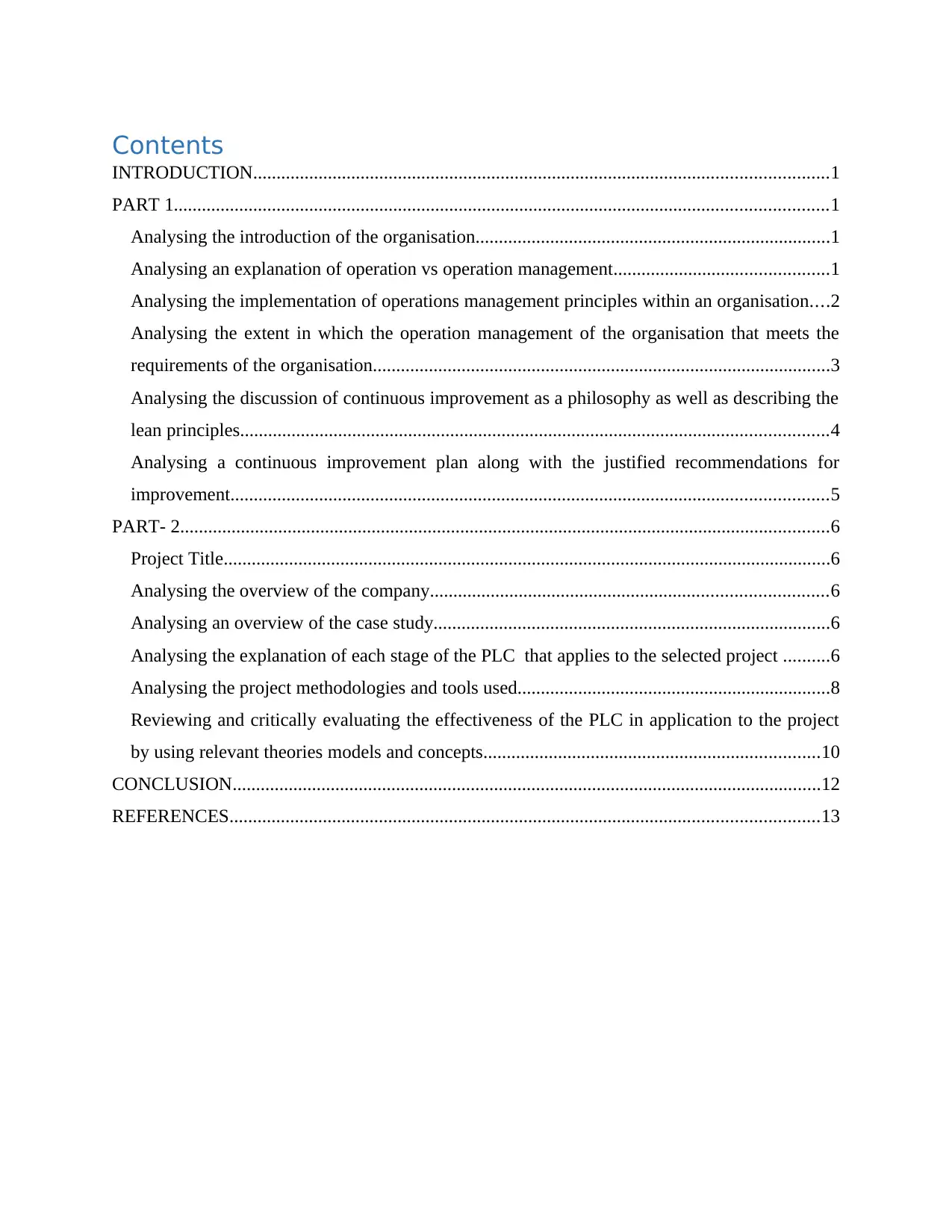
Contents
INTRODUCTION...........................................................................................................................1
PART 1............................................................................................................................................1
Analysing the introduction of the organisation............................................................................1
Analysing an explanation of operation vs operation management..............................................1
Analysing the implementation of operations management principles within an organisation....2
Analysing the extent in which the operation management of the organisation that meets the
requirements of the organisation..................................................................................................3
Analysing the discussion of continuous improvement as a philosophy as well as describing the
lean principles..............................................................................................................................4
Analysing a continuous improvement plan along with the justified recommendations for
improvement................................................................................................................................5
PART- 2...........................................................................................................................................6
Project Title..................................................................................................................................6
Analysing the overview of the company.....................................................................................6
Analysing an overview of the case study.....................................................................................6
Analysing the explanation of each stage of the PLC that applies to the selected project ..........6
Analysing the project methodologies and tools used...................................................................8
Reviewing and critically evaluating the effectiveness of the PLC in application to the project
by using relevant theories models and concepts........................................................................10
CONCLUSION..............................................................................................................................12
REFERENCES..............................................................................................................................13
INTRODUCTION...........................................................................................................................1
PART 1............................................................................................................................................1
Analysing the introduction of the organisation............................................................................1
Analysing an explanation of operation vs operation management..............................................1
Analysing the implementation of operations management principles within an organisation....2
Analysing the extent in which the operation management of the organisation that meets the
requirements of the organisation..................................................................................................3
Analysing the discussion of continuous improvement as a philosophy as well as describing the
lean principles..............................................................................................................................4
Analysing a continuous improvement plan along with the justified recommendations for
improvement................................................................................................................................5
PART- 2...........................................................................................................................................6
Project Title..................................................................................................................................6
Analysing the overview of the company.....................................................................................6
Analysing an overview of the case study.....................................................................................6
Analysing the explanation of each stage of the PLC that applies to the selected project ..........6
Analysing the project methodologies and tools used...................................................................8
Reviewing and critically evaluating the effectiveness of the PLC in application to the project
by using relevant theories models and concepts........................................................................10
CONCLUSION..............................................................................................................................12
REFERENCES..............................................................................................................................13

⊘ This is a preview!⊘
Do you want full access?
Subscribe today to unlock all pages.

Trusted by 1+ million students worldwide
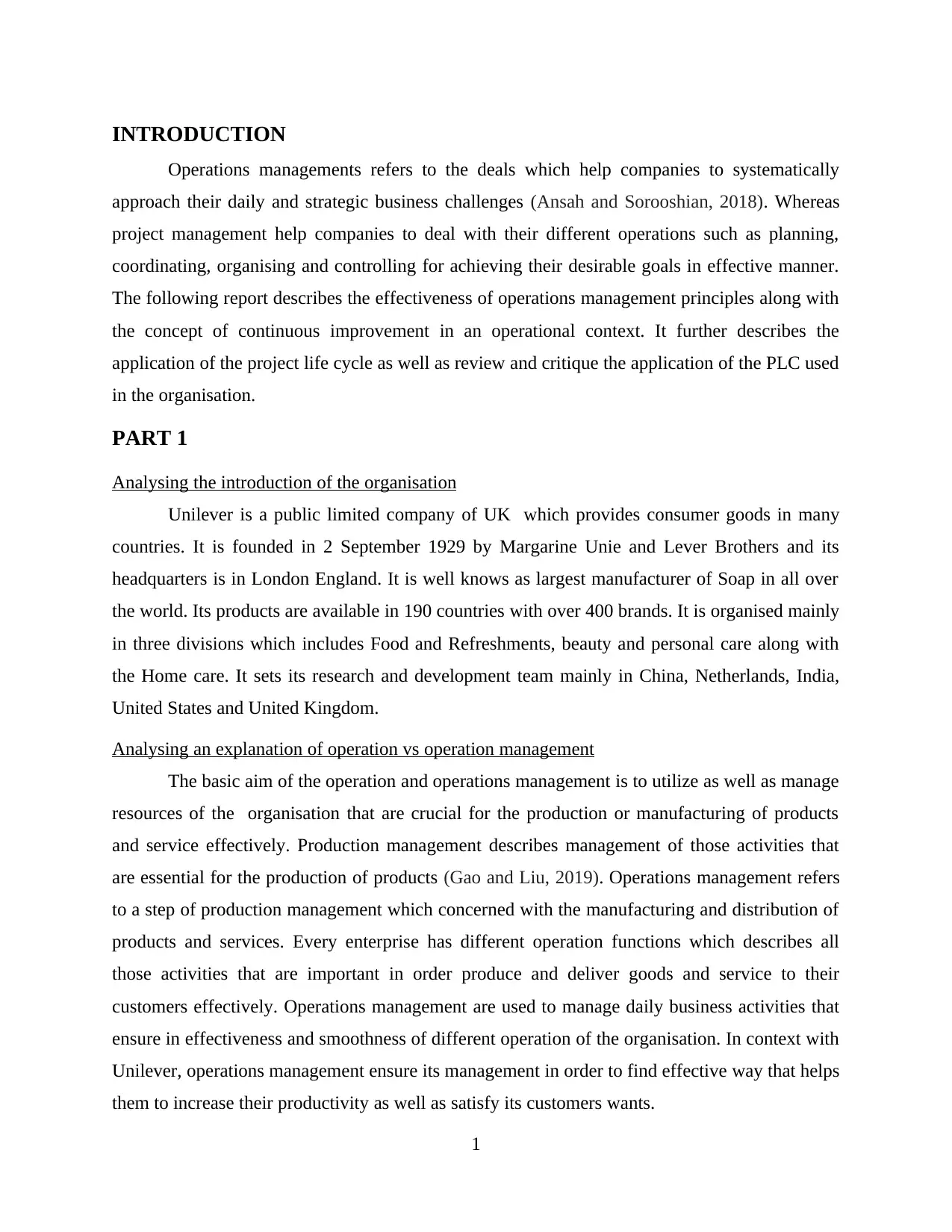
INTRODUCTION
Operations managements refers to the deals which help companies to systematically
approach their daily and strategic business challenges (Ansah and Sorooshian, 2018). Whereas
project management help companies to deal with their different operations such as planning,
coordinating, organising and controlling for achieving their desirable goals in effective manner.
The following report describes the effectiveness of operations management principles along with
the concept of continuous improvement in an operational context. It further describes the
application of the project life cycle as well as review and critique the application of the PLC used
in the organisation.
PART 1
Analysing the introduction of the organisation
Unilever is a public limited company of UK which provides consumer goods in many
countries. It is founded in 2 September 1929 by Margarine Unie and Lever Brothers and its
headquarters is in London England. It is well knows as largest manufacturer of Soap in all over
the world. Its products are available in 190 countries with over 400 brands. It is organised mainly
in three divisions which includes Food and Refreshments, beauty and personal care along with
the Home care. It sets its research and development team mainly in China, Netherlands, India,
United States and United Kingdom.
Analysing an explanation of operation vs operation management
The basic aim of the operation and operations management is to utilize as well as manage
resources of the organisation that are crucial for the production or manufacturing of products
and service effectively. Production management describes management of those activities that
are essential for the production of products (Gao and Liu, 2019). Operations management refers
to a step of production management which concerned with the manufacturing and distribution of
products and services. Every enterprise has different operation functions which describes all
those activities that are important in order produce and deliver goods and service to their
customers effectively. Operations management are used to manage daily business activities that
ensure in effectiveness and smoothness of different operation of the organisation. In context with
Unilever, operations management ensure its management in order to find effective way that helps
them to increase their productivity as well as satisfy its customers wants.
1
Operations managements refers to the deals which help companies to systematically
approach their daily and strategic business challenges (Ansah and Sorooshian, 2018). Whereas
project management help companies to deal with their different operations such as planning,
coordinating, organising and controlling for achieving their desirable goals in effective manner.
The following report describes the effectiveness of operations management principles along with
the concept of continuous improvement in an operational context. It further describes the
application of the project life cycle as well as review and critique the application of the PLC used
in the organisation.
PART 1
Analysing the introduction of the organisation
Unilever is a public limited company of UK which provides consumer goods in many
countries. It is founded in 2 September 1929 by Margarine Unie and Lever Brothers and its
headquarters is in London England. It is well knows as largest manufacturer of Soap in all over
the world. Its products are available in 190 countries with over 400 brands. It is organised mainly
in three divisions which includes Food and Refreshments, beauty and personal care along with
the Home care. It sets its research and development team mainly in China, Netherlands, India,
United States and United Kingdom.
Analysing an explanation of operation vs operation management
The basic aim of the operation and operations management is to utilize as well as manage
resources of the organisation that are crucial for the production or manufacturing of products
and service effectively. Production management describes management of those activities that
are essential for the production of products (Gao and Liu, 2019). Operations management refers
to a step of production management which concerned with the manufacturing and distribution of
products and services. Every enterprise has different operation functions which describes all
those activities that are important in order produce and deliver goods and service to their
customers effectively. Operations management are used to manage daily business activities that
ensure in effectiveness and smoothness of different operation of the organisation. In context with
Unilever, operations management ensure its management in order to find effective way that helps
them to increase their productivity as well as satisfy its customers wants.
1
Paraphrase This Document
Need a fresh take? Get an instant paraphrase of this document with our AI Paraphraser
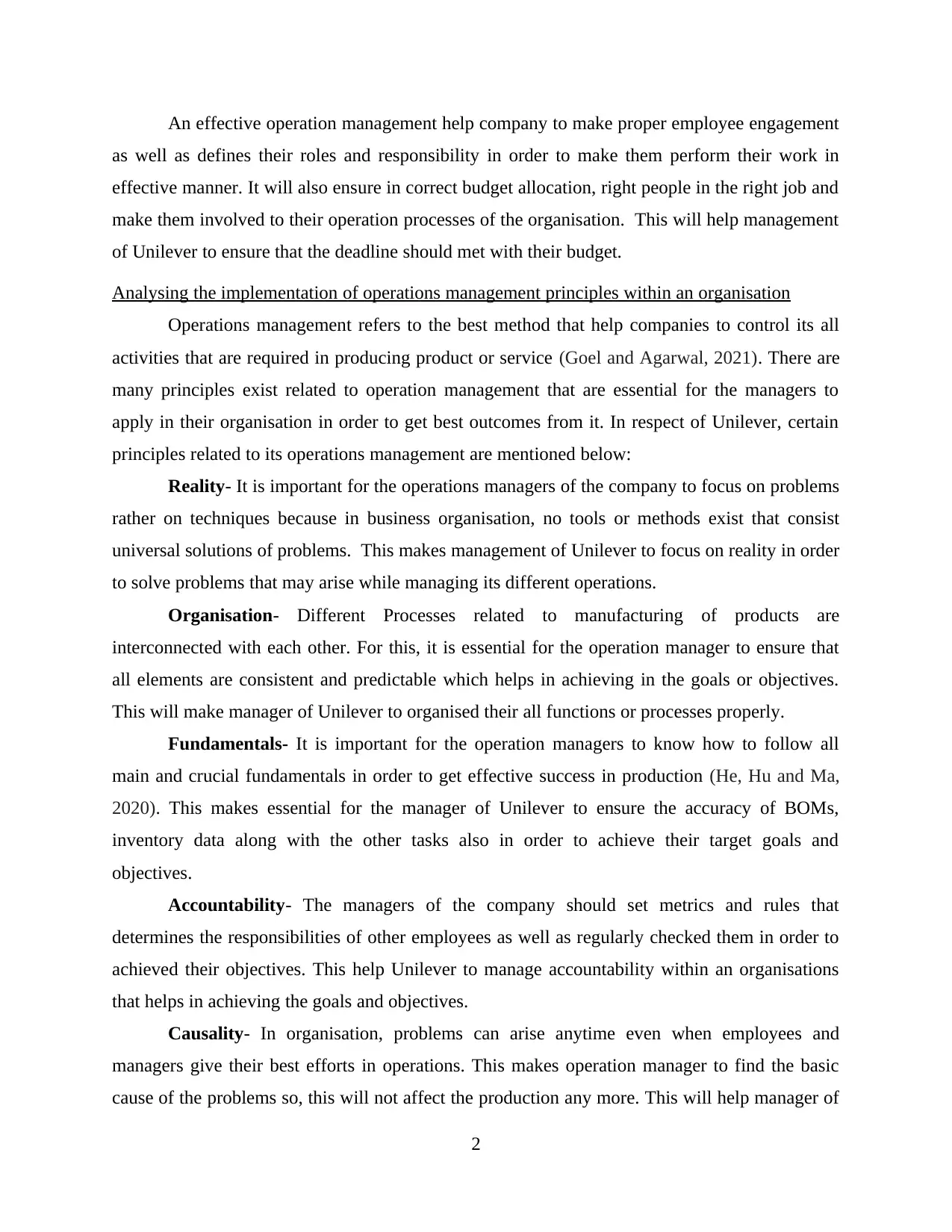
An effective operation management help company to make proper employee engagement
as well as defines their roles and responsibility in order to make them perform their work in
effective manner. It will also ensure in correct budget allocation, right people in the right job and
make them involved to their operation processes of the organisation. This will help management
of Unilever to ensure that the deadline should met with their budget.
Analysing the implementation of operations management principles within an organisation
Operations management refers to the best method that help companies to control its all
activities that are required in producing product or service (Goel and Agarwal, 2021). There are
many principles exist related to operation management that are essential for the managers to
apply in their organisation in order to get best outcomes from it. In respect of Unilever, certain
principles related to its operations management are mentioned below:
Reality- It is important for the operations managers of the company to focus on problems
rather on techniques because in business organisation, no tools or methods exist that consist
universal solutions of problems. This makes management of Unilever to focus on reality in order
to solve problems that may arise while managing its different operations.
Organisation- Different Processes related to manufacturing of products are
interconnected with each other. For this, it is essential for the operation manager to ensure that
all elements are consistent and predictable which helps in achieving in the goals or objectives.
This will make manager of Unilever to organised their all functions or processes properly.
Fundamentals- It is important for the operation managers to know how to follow all
main and crucial fundamentals in order to get effective success in production (He, Hu and Ma,
2020). This makes essential for the manager of Unilever to ensure the accuracy of BOMs,
inventory data along with the other tasks also in order to achieve their target goals and
objectives.
Accountability- The managers of the company should set metrics and rules that
determines the responsibilities of other employees as well as regularly checked them in order to
achieved their objectives. This help Unilever to manage accountability within an organisations
that helps in achieving the goals and objectives.
Causality- In organisation, problems can arise anytime even when employees and
managers give their best efforts in operations. This makes operation manager to find the basic
cause of the problems so, this will not affect the production any more. This will help manager of
2
as well as defines their roles and responsibility in order to make them perform their work in
effective manner. It will also ensure in correct budget allocation, right people in the right job and
make them involved to their operation processes of the organisation. This will help management
of Unilever to ensure that the deadline should met with their budget.
Analysing the implementation of operations management principles within an organisation
Operations management refers to the best method that help companies to control its all
activities that are required in producing product or service (Goel and Agarwal, 2021). There are
many principles exist related to operation management that are essential for the managers to
apply in their organisation in order to get best outcomes from it. In respect of Unilever, certain
principles related to its operations management are mentioned below:
Reality- It is important for the operations managers of the company to focus on problems
rather on techniques because in business organisation, no tools or methods exist that consist
universal solutions of problems. This makes management of Unilever to focus on reality in order
to solve problems that may arise while managing its different operations.
Organisation- Different Processes related to manufacturing of products are
interconnected with each other. For this, it is essential for the operation manager to ensure that
all elements are consistent and predictable which helps in achieving in the goals or objectives.
This will make manager of Unilever to organised their all functions or processes properly.
Fundamentals- It is important for the operation managers to know how to follow all
main and crucial fundamentals in order to get effective success in production (He, Hu and Ma,
2020). This makes essential for the manager of Unilever to ensure the accuracy of BOMs,
inventory data along with the other tasks also in order to achieve their target goals and
objectives.
Accountability- The managers of the company should set metrics and rules that
determines the responsibilities of other employees as well as regularly checked them in order to
achieved their objectives. This help Unilever to manage accountability within an organisations
that helps in achieving the goals and objectives.
Causality- In organisation, problems can arise anytime even when employees and
managers give their best efforts in operations. This makes operation manager to find the basic
cause of the problems so, this will not affect the production any more. This will help manager of
2
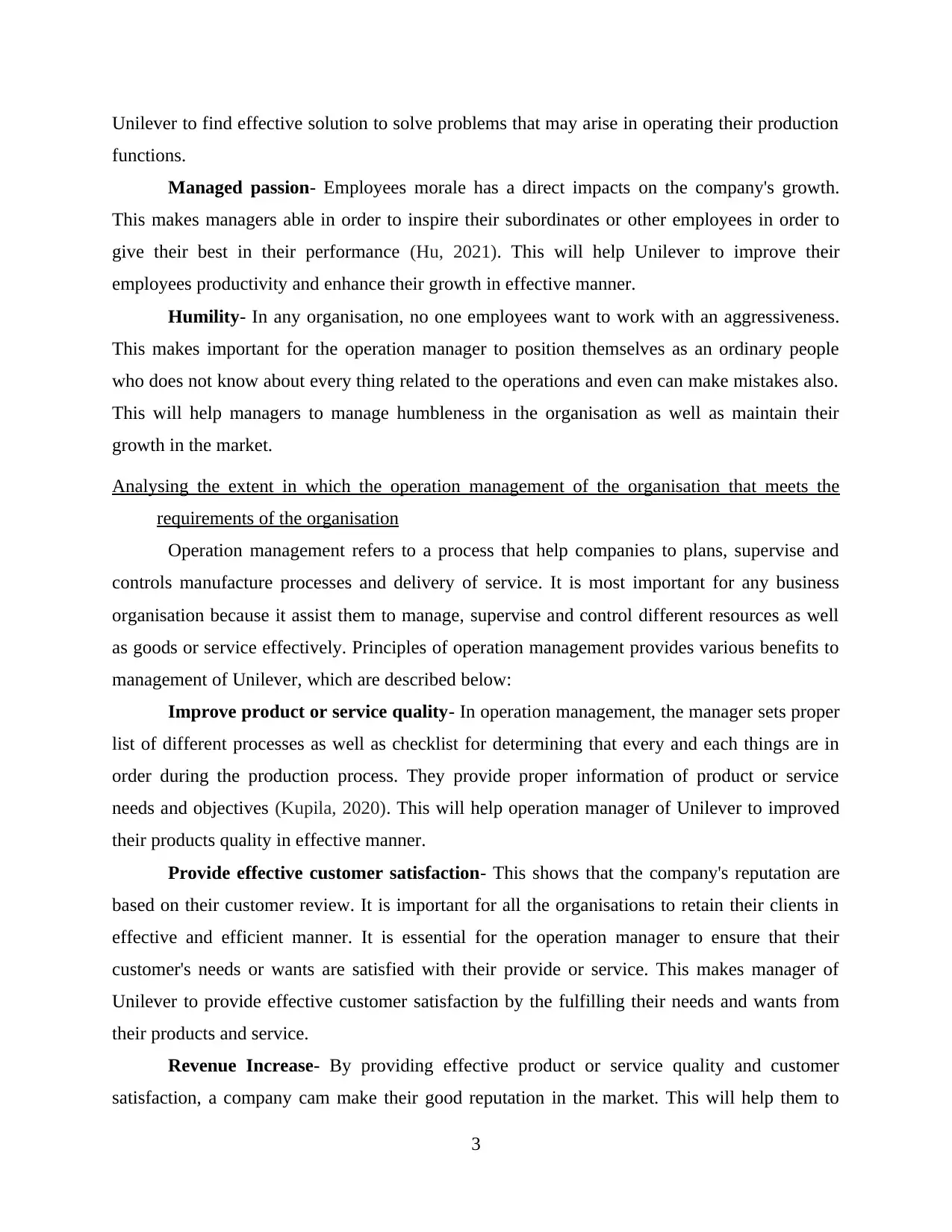
Unilever to find effective solution to solve problems that may arise in operating their production
functions.
Managed passion- Employees morale has a direct impacts on the company's growth.
This makes managers able in order to inspire their subordinates or other employees in order to
give their best in their performance (Hu, 2021). This will help Unilever to improve their
employees productivity and enhance their growth in effective manner.
Humility- In any organisation, no one employees want to work with an aggressiveness.
This makes important for the operation manager to position themselves as an ordinary people
who does not know about every thing related to the operations and even can make mistakes also.
This will help managers to manage humbleness in the organisation as well as maintain their
growth in the market.
Analysing the extent in which the operation management of the organisation that meets the
requirements of the organisation
Operation management refers to a process that help companies to plans, supervise and
controls manufacture processes and delivery of service. It is most important for any business
organisation because it assist them to manage, supervise and control different resources as well
as goods or service effectively. Principles of operation management provides various benefits to
management of Unilever, which are described below:
Improve product or service quality- In operation management, the manager sets proper
list of different processes as well as checklist for determining that every and each things are in
order during the production process. They provide proper information of product or service
needs and objectives (Kupila, 2020). This will help operation manager of Unilever to improved
their products quality in effective manner.
Provide effective customer satisfaction- This shows that the company's reputation are
based on their customer review. It is important for all the organisations to retain their clients in
effective and efficient manner. It is essential for the operation manager to ensure that their
customer's needs or wants are satisfied with their provide or service. This makes manager of
Unilever to provide effective customer satisfaction by the fulfilling their needs and wants from
their products and service.
Revenue Increase- By providing effective product or service quality and customer
satisfaction, a company cam make their good reputation in the market. This will help them to
3
functions.
Managed passion- Employees morale has a direct impacts on the company's growth.
This makes managers able in order to inspire their subordinates or other employees in order to
give their best in their performance (Hu, 2021). This will help Unilever to improve their
employees productivity and enhance their growth in effective manner.
Humility- In any organisation, no one employees want to work with an aggressiveness.
This makes important for the operation manager to position themselves as an ordinary people
who does not know about every thing related to the operations and even can make mistakes also.
This will help managers to manage humbleness in the organisation as well as maintain their
growth in the market.
Analysing the extent in which the operation management of the organisation that meets the
requirements of the organisation
Operation management refers to a process that help companies to plans, supervise and
controls manufacture processes and delivery of service. It is most important for any business
organisation because it assist them to manage, supervise and control different resources as well
as goods or service effectively. Principles of operation management provides various benefits to
management of Unilever, which are described below:
Improve product or service quality- In operation management, the manager sets proper
list of different processes as well as checklist for determining that every and each things are in
order during the production process. They provide proper information of product or service
needs and objectives (Kupila, 2020). This will help operation manager of Unilever to improved
their products quality in effective manner.
Provide effective customer satisfaction- This shows that the company's reputation are
based on their customer review. It is important for all the organisations to retain their clients in
effective and efficient manner. It is essential for the operation manager to ensure that their
customer's needs or wants are satisfied with their provide or service. This makes manager of
Unilever to provide effective customer satisfaction by the fulfilling their needs and wants from
their products and service.
Revenue Increase- By providing effective product or service quality and customer
satisfaction, a company cam make their good reputation in the market. This will help them to
3
⊘ This is a preview!⊘
Do you want full access?
Subscribe today to unlock all pages.

Trusted by 1+ million students worldwide
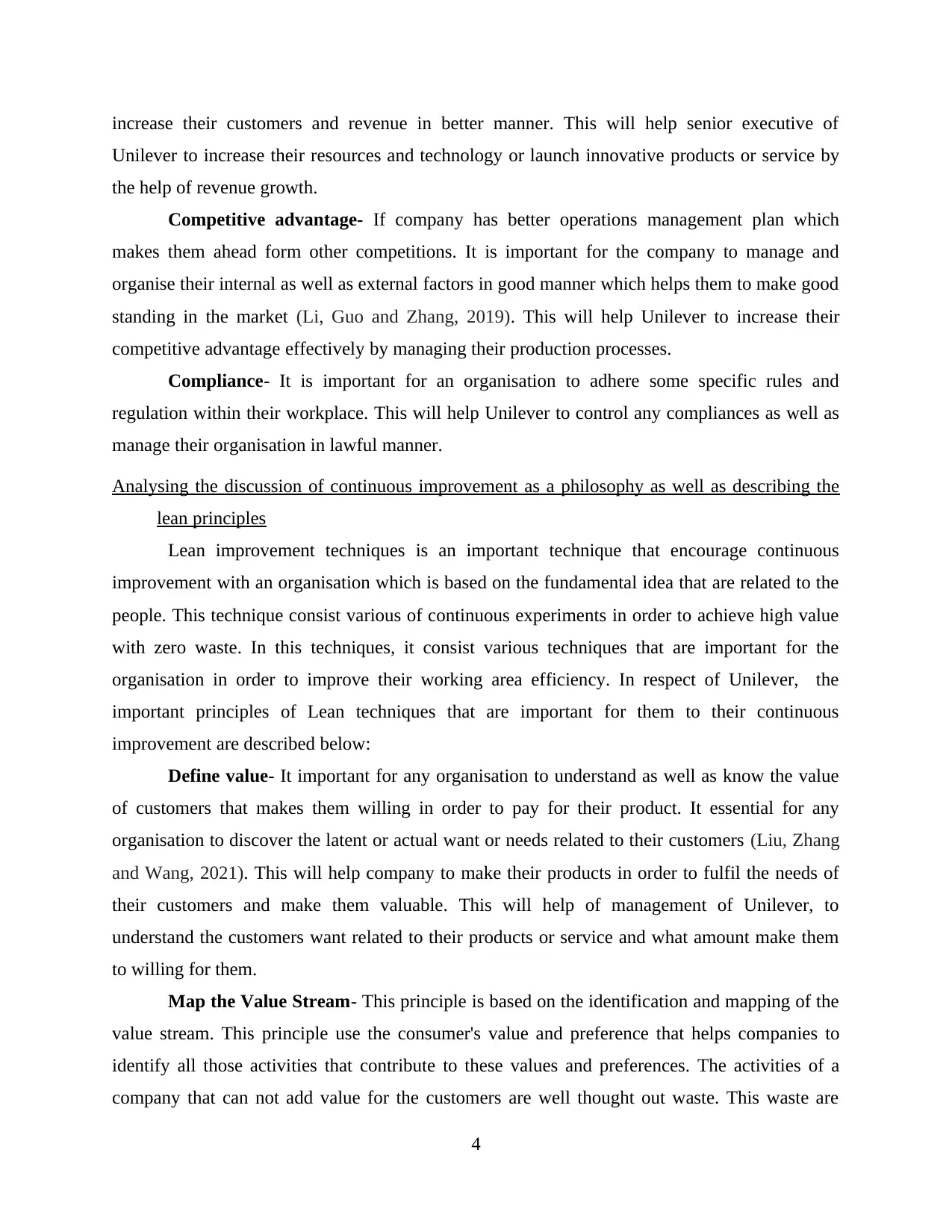
increase their customers and revenue in better manner. This will help senior executive of
Unilever to increase their resources and technology or launch innovative products or service by
the help of revenue growth.
Competitive advantage- If company has better operations management plan which
makes them ahead form other competitions. It is important for the company to manage and
organise their internal as well as external factors in good manner which helps them to make good
standing in the market (Li, Guo and Zhang, 2019). This will help Unilever to increase their
competitive advantage effectively by managing their production processes.
Compliance- It is important for an organisation to adhere some specific rules and
regulation within their workplace. This will help Unilever to control any compliances as well as
manage their organisation in lawful manner.
Analysing the discussion of continuous improvement as a philosophy as well as describing the
lean principles
Lean improvement techniques is an important technique that encourage continuous
improvement with an organisation which is based on the fundamental idea that are related to the
people. This technique consist various of continuous experiments in order to achieve high value
with zero waste. In this techniques, it consist various techniques that are important for the
organisation in order to improve their working area efficiency. In respect of Unilever, the
important principles of Lean techniques that are important for them to their continuous
improvement are described below:
Define value- It important for any organisation to understand as well as know the value
of customers that makes them willing in order to pay for their product. It essential for any
organisation to discover the latent or actual want or needs related to their customers (Liu, Zhang
and Wang, 2021). This will help company to make their products in order to fulfil the needs of
their customers and make them valuable. This will help of management of Unilever, to
understand the customers want related to their products or service and what amount make them
to willing for them.
Map the Value Stream- This principle is based on the identification and mapping of the
value stream. This principle use the consumer's value and preference that helps companies to
identify all those activities that contribute to these values and preferences. The activities of a
company that can not add value for the customers are well thought out waste. This waste are
4
Unilever to increase their resources and technology or launch innovative products or service by
the help of revenue growth.
Competitive advantage- If company has better operations management plan which
makes them ahead form other competitions. It is important for the company to manage and
organise their internal as well as external factors in good manner which helps them to make good
standing in the market (Li, Guo and Zhang, 2019). This will help Unilever to increase their
competitive advantage effectively by managing their production processes.
Compliance- It is important for an organisation to adhere some specific rules and
regulation within their workplace. This will help Unilever to control any compliances as well as
manage their organisation in lawful manner.
Analysing the discussion of continuous improvement as a philosophy as well as describing the
lean principles
Lean improvement techniques is an important technique that encourage continuous
improvement with an organisation which is based on the fundamental idea that are related to the
people. This technique consist various of continuous experiments in order to achieve high value
with zero waste. In this techniques, it consist various techniques that are important for the
organisation in order to improve their working area efficiency. In respect of Unilever, the
important principles of Lean techniques that are important for them to their continuous
improvement are described below:
Define value- It important for any organisation to understand as well as know the value
of customers that makes them willing in order to pay for their product. It essential for any
organisation to discover the latent or actual want or needs related to their customers (Liu, Zhang
and Wang, 2021). This will help company to make their products in order to fulfil the needs of
their customers and make them valuable. This will help of management of Unilever, to
understand the customers want related to their products or service and what amount make them
to willing for them.
Map the Value Stream- This principle is based on the identification and mapping of the
value stream. This principle use the consumer's value and preference that helps companies to
identify all those activities that contribute to these values and preferences. The activities of a
company that can not add value for the customers are well thought out waste. This waste are
4
Paraphrase This Document
Need a fresh take? Get an instant paraphrase of this document with our AI Paraphraser
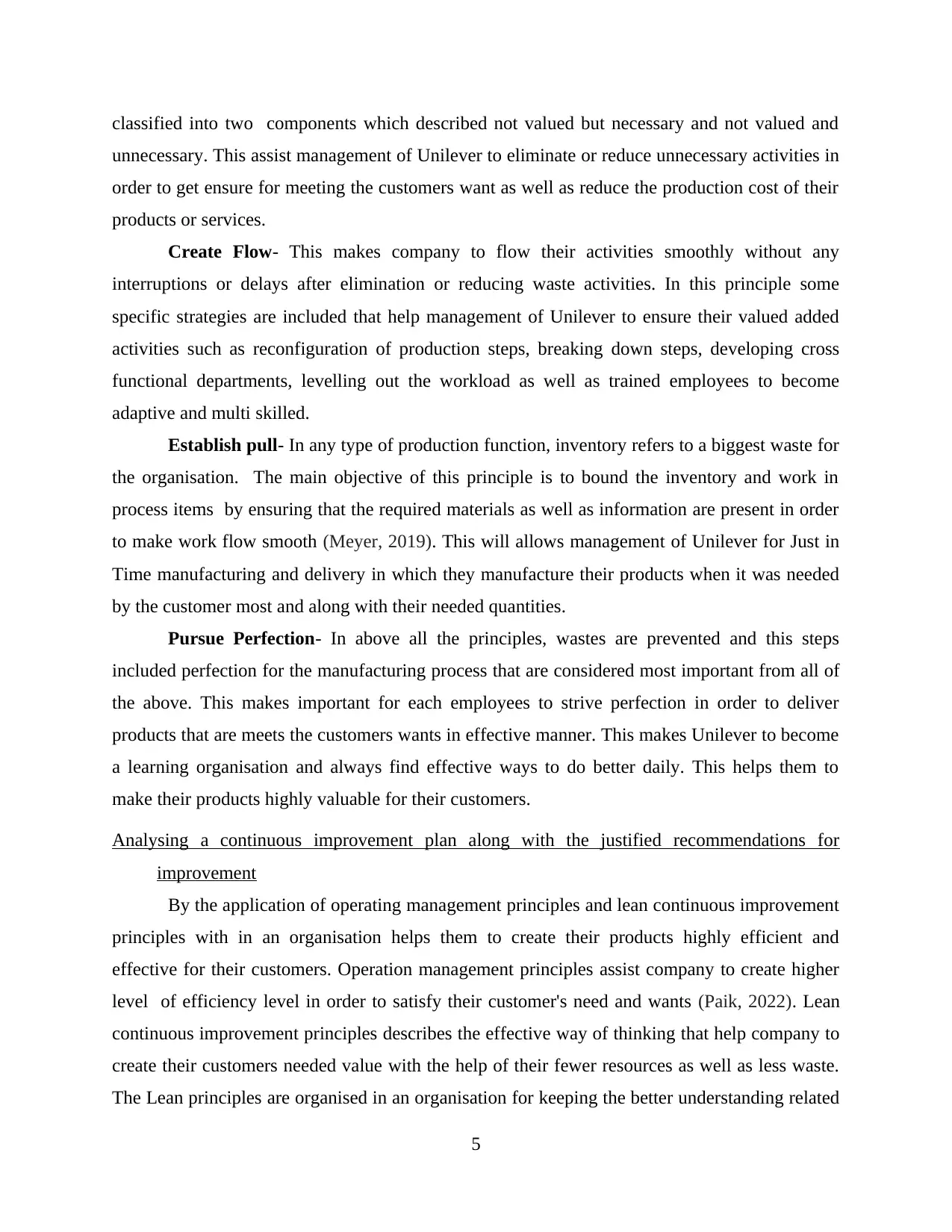
classified into two components which described not valued but necessary and not valued and
unnecessary. This assist management of Unilever to eliminate or reduce unnecessary activities in
order to get ensure for meeting the customers want as well as reduce the production cost of their
products or services.
Create Flow- This makes company to flow their activities smoothly without any
interruptions or delays after elimination or reducing waste activities. In this principle some
specific strategies are included that help management of Unilever to ensure their valued added
activities such as reconfiguration of production steps, breaking down steps, developing cross
functional departments, levelling out the workload as well as trained employees to become
adaptive and multi skilled.
Establish pull- In any type of production function, inventory refers to a biggest waste for
the organisation. The main objective of this principle is to bound the inventory and work in
process items by ensuring that the required materials as well as information are present in order
to make work flow smooth (Meyer, 2019). This will allows management of Unilever for Just in
Time manufacturing and delivery in which they manufacture their products when it was needed
by the customer most and along with their needed quantities.
Pursue Perfection- In above all the principles, wastes are prevented and this steps
included perfection for the manufacturing process that are considered most important from all of
the above. This makes important for each employees to strive perfection in order to deliver
products that are meets the customers wants in effective manner. This makes Unilever to become
a learning organisation and always find effective ways to do better daily. This helps them to
make their products highly valuable for their customers.
Analysing a continuous improvement plan along with the justified recommendations for
improvement
By the application of operating management principles and lean continuous improvement
principles with in an organisation helps them to create their products highly efficient and
effective for their customers. Operation management principles assist company to create higher
level of efficiency level in order to satisfy their customer's need and wants (Paik, 2022). Lean
continuous improvement principles describes the effective way of thinking that help company to
create their customers needed value with the help of their fewer resources as well as less waste.
The Lean principles are organised in an organisation for keeping the better understanding related
5
unnecessary. This assist management of Unilever to eliminate or reduce unnecessary activities in
order to get ensure for meeting the customers want as well as reduce the production cost of their
products or services.
Create Flow- This makes company to flow their activities smoothly without any
interruptions or delays after elimination or reducing waste activities. In this principle some
specific strategies are included that help management of Unilever to ensure their valued added
activities such as reconfiguration of production steps, breaking down steps, developing cross
functional departments, levelling out the workload as well as trained employees to become
adaptive and multi skilled.
Establish pull- In any type of production function, inventory refers to a biggest waste for
the organisation. The main objective of this principle is to bound the inventory and work in
process items by ensuring that the required materials as well as information are present in order
to make work flow smooth (Meyer, 2019). This will allows management of Unilever for Just in
Time manufacturing and delivery in which they manufacture their products when it was needed
by the customer most and along with their needed quantities.
Pursue Perfection- In above all the principles, wastes are prevented and this steps
included perfection for the manufacturing process that are considered most important from all of
the above. This makes important for each employees to strive perfection in order to deliver
products that are meets the customers wants in effective manner. This makes Unilever to become
a learning organisation and always find effective ways to do better daily. This helps them to
make their products highly valuable for their customers.
Analysing a continuous improvement plan along with the justified recommendations for
improvement
By the application of operating management principles and lean continuous improvement
principles with in an organisation helps them to create their products highly efficient and
effective for their customers. Operation management principles assist company to create higher
level of efficiency level in order to satisfy their customer's need and wants (Paik, 2022). Lean
continuous improvement principles describes the effective way of thinking that help company to
create their customers needed value with the help of their fewer resources as well as less waste.
The Lean principles are organised in an organisation for keeping the better understanding related
5
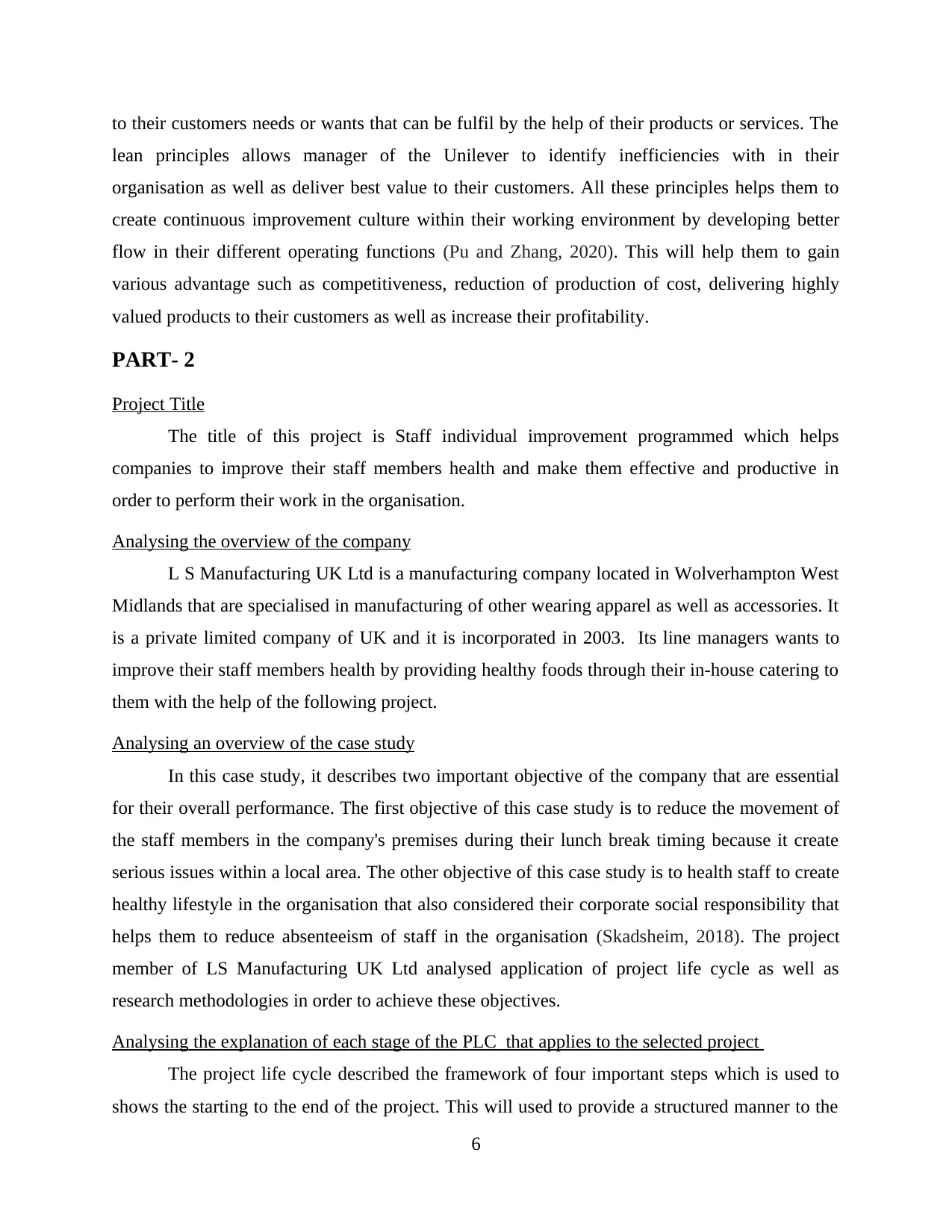
to their customers needs or wants that can be fulfil by the help of their products or services. The
lean principles allows manager of the Unilever to identify inefficiencies with in their
organisation as well as deliver best value to their customers. All these principles helps them to
create continuous improvement culture within their working environment by developing better
flow in their different operating functions (Pu and Zhang, 2020). This will help them to gain
various advantage such as competitiveness, reduction of production of cost, delivering highly
valued products to their customers as well as increase their profitability.
PART- 2
Project Title
The title of this project is Staff individual improvement programmed which helps
companies to improve their staff members health and make them effective and productive in
order to perform their work in the organisation.
Analysing the overview of the company
L S Manufacturing UK Ltd is a manufacturing company located in Wolverhampton West
Midlands that are specialised in manufacturing of other wearing apparel as well as accessories. It
is a private limited company of UK and it is incorporated in 2003. Its line managers wants to
improve their staff members health by providing healthy foods through their in-house catering to
them with the help of the following project.
Analysing an overview of the case study
In this case study, it describes two important objective of the company that are essential
for their overall performance. The first objective of this case study is to reduce the movement of
the staff members in the company's premises during their lunch break timing because it create
serious issues within a local area. The other objective of this case study is to health staff to create
healthy lifestyle in the organisation that also considered their corporate social responsibility that
helps them to reduce absenteeism of staff in the organisation (Skadsheim, 2018). The project
member of LS Manufacturing UK Ltd analysed application of project life cycle as well as
research methodologies in order to achieve these objectives.
Analysing the explanation of each stage of the PLC that applies to the selected project
The project life cycle described the framework of four important steps which is used to
shows the starting to the end of the project. This will used to provide a structured manner to the
6
lean principles allows manager of the Unilever to identify inefficiencies with in their
organisation as well as deliver best value to their customers. All these principles helps them to
create continuous improvement culture within their working environment by developing better
flow in their different operating functions (Pu and Zhang, 2020). This will help them to gain
various advantage such as competitiveness, reduction of production of cost, delivering highly
valued products to their customers as well as increase their profitability.
PART- 2
Project Title
The title of this project is Staff individual improvement programmed which helps
companies to improve their staff members health and make them effective and productive in
order to perform their work in the organisation.
Analysing the overview of the company
L S Manufacturing UK Ltd is a manufacturing company located in Wolverhampton West
Midlands that are specialised in manufacturing of other wearing apparel as well as accessories. It
is a private limited company of UK and it is incorporated in 2003. Its line managers wants to
improve their staff members health by providing healthy foods through their in-house catering to
them with the help of the following project.
Analysing an overview of the case study
In this case study, it describes two important objective of the company that are essential
for their overall performance. The first objective of this case study is to reduce the movement of
the staff members in the company's premises during their lunch break timing because it create
serious issues within a local area. The other objective of this case study is to health staff to create
healthy lifestyle in the organisation that also considered their corporate social responsibility that
helps them to reduce absenteeism of staff in the organisation (Skadsheim, 2018). The project
member of LS Manufacturing UK Ltd analysed application of project life cycle as well as
research methodologies in order to achieve these objectives.
Analysing the explanation of each stage of the PLC that applies to the selected project
The project life cycle described the framework of four important steps which is used to
shows the starting to the end of the project. This will used to provide a structured manner to the
6
⊘ This is a preview!⊘
Do you want full access?
Subscribe today to unlock all pages.

Trusted by 1+ million students worldwide
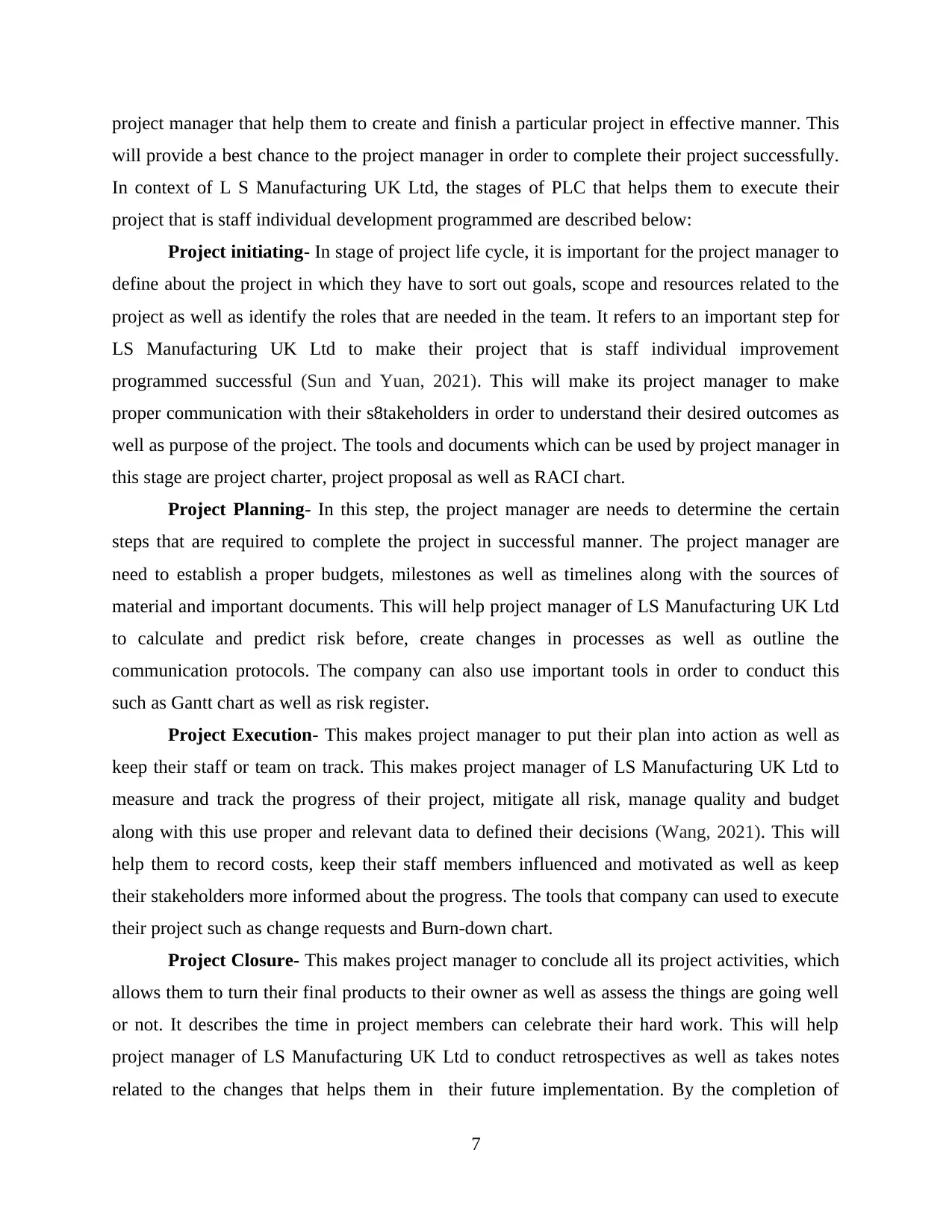
project manager that help them to create and finish a particular project in effective manner. This
will provide a best chance to the project manager in order to complete their project successfully.
In context of L S Manufacturing UK Ltd, the stages of PLC that helps them to execute their
project that is staff individual development programmed are described below:
Project initiating- In stage of project life cycle, it is important for the project manager to
define about the project in which they have to sort out goals, scope and resources related to the
project as well as identify the roles that are needed in the team. It refers to an important step for
LS Manufacturing UK Ltd to make their project that is staff individual improvement
programmed successful (Sun and Yuan, 2021). This will make its project manager to make
proper communication with their s8takeholders in order to understand their desired outcomes as
well as purpose of the project. The tools and documents which can be used by project manager in
this stage are project charter, project proposal as well as RACI chart.
Project Planning- In this step, the project manager are needs to determine the certain
steps that are required to complete the project in successful manner. The project manager are
need to establish a proper budgets, milestones as well as timelines along with the sources of
material and important documents. This will help project manager of LS Manufacturing UK Ltd
to calculate and predict risk before, create changes in processes as well as outline the
communication protocols. The company can also use important tools in order to conduct this
such as Gantt chart as well as risk register.
Project Execution- This makes project manager to put their plan into action as well as
keep their staff or team on track. This makes project manager of LS Manufacturing UK Ltd to
measure and track the progress of their project, mitigate all risk, manage quality and budget
along with this use proper and relevant data to defined their decisions (Wang, 2021). This will
help them to record costs, keep their staff members influenced and motivated as well as keep
their stakeholders more informed about the progress. The tools that company can used to execute
their project such as change requests and Burn-down chart.
Project Closure- This makes project manager to conclude all its project activities, which
allows them to turn their final products to their owner as well as assess the things are going well
or not. It describes the time in project members can celebrate their hard work. This will help
project manager of LS Manufacturing UK Ltd to conduct retrospectives as well as takes notes
related to the changes that helps them in their future implementation. By the completion of
7
will provide a best chance to the project manager in order to complete their project successfully.
In context of L S Manufacturing UK Ltd, the stages of PLC that helps them to execute their
project that is staff individual development programmed are described below:
Project initiating- In stage of project life cycle, it is important for the project manager to
define about the project in which they have to sort out goals, scope and resources related to the
project as well as identify the roles that are needed in the team. It refers to an important step for
LS Manufacturing UK Ltd to make their project that is staff individual improvement
programmed successful (Sun and Yuan, 2021). This will make its project manager to make
proper communication with their s8takeholders in order to understand their desired outcomes as
well as purpose of the project. The tools and documents which can be used by project manager in
this stage are project charter, project proposal as well as RACI chart.
Project Planning- In this step, the project manager are needs to determine the certain
steps that are required to complete the project in successful manner. The project manager are
need to establish a proper budgets, milestones as well as timelines along with the sources of
material and important documents. This will help project manager of LS Manufacturing UK Ltd
to calculate and predict risk before, create changes in processes as well as outline the
communication protocols. The company can also use important tools in order to conduct this
such as Gantt chart as well as risk register.
Project Execution- This makes project manager to put their plan into action as well as
keep their staff or team on track. This makes project manager of LS Manufacturing UK Ltd to
measure and track the progress of their project, mitigate all risk, manage quality and budget
along with this use proper and relevant data to defined their decisions (Wang, 2021). This will
help them to record costs, keep their staff members influenced and motivated as well as keep
their stakeholders more informed about the progress. The tools that company can used to execute
their project such as change requests and Burn-down chart.
Project Closure- This makes project manager to conclude all its project activities, which
allows them to turn their final products to their owner as well as assess the things are going well
or not. It describes the time in project members can celebrate their hard work. This will help
project manager of LS Manufacturing UK Ltd to conduct retrospectives as well as takes notes
related to the changes that helps them in their future implementation. By the completion of
7
Paraphrase This Document
Need a fresh take? Get an instant paraphrase of this document with our AI Paraphraser
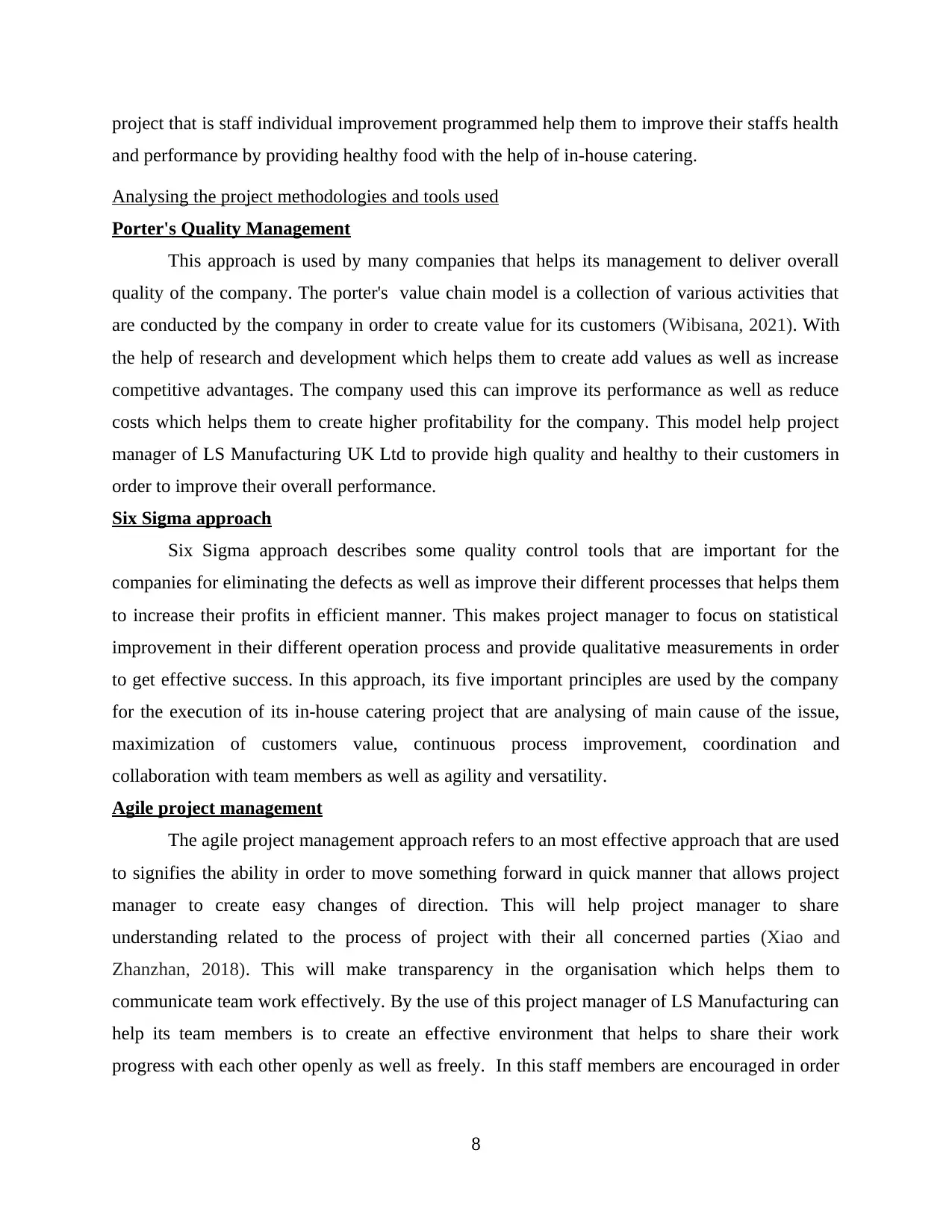
project that is staff individual improvement programmed help them to improve their staffs health
and performance by providing healthy food with the help of in-house catering.
Analysing the project methodologies and tools used
Porter's Quality Management
This approach is used by many companies that helps its management to deliver overall
quality of the company. The porter's value chain model is a collection of various activities that
are conducted by the company in order to create value for its customers (Wibisana, 2021). With
the help of research and development which helps them to create add values as well as increase
competitive advantages. The company used this can improve its performance as well as reduce
costs which helps them to create higher profitability for the company. This model help project
manager of LS Manufacturing UK Ltd to provide high quality and healthy to their customers in
order to improve their overall performance.
Six Sigma approach
Six Sigma approach describes some quality control tools that are important for the
companies for eliminating the defects as well as improve their different processes that helps them
to increase their profits in efficient manner. This makes project manager to focus on statistical
improvement in their different operation process and provide qualitative measurements in order
to get effective success. In this approach, its five important principles are used by the company
for the execution of its in-house catering project that are analysing of main cause of the issue,
maximization of customers value, continuous process improvement, coordination and
collaboration with team members as well as agility and versatility.
Agile project management
The agile project management approach refers to an most effective approach that are used
to signifies the ability in order to move something forward in quick manner that allows project
manager to create easy changes of direction. This will help project manager to share
understanding related to the process of project with their all concerned parties (Xiao and
Zhanzhan, 2018). This will make transparency in the organisation which helps them to
communicate team work effectively. By the use of this project manager of LS Manufacturing can
help its team members is to create an effective environment that helps to share their work
progress with each other openly as well as freely. In this staff members are encouraged in order
8
and performance by providing healthy food with the help of in-house catering.
Analysing the project methodologies and tools used
Porter's Quality Management
This approach is used by many companies that helps its management to deliver overall
quality of the company. The porter's value chain model is a collection of various activities that
are conducted by the company in order to create value for its customers (Wibisana, 2021). With
the help of research and development which helps them to create add values as well as increase
competitive advantages. The company used this can improve its performance as well as reduce
costs which helps them to create higher profitability for the company. This model help project
manager of LS Manufacturing UK Ltd to provide high quality and healthy to their customers in
order to improve their overall performance.
Six Sigma approach
Six Sigma approach describes some quality control tools that are important for the
companies for eliminating the defects as well as improve their different processes that helps them
to increase their profits in efficient manner. This makes project manager to focus on statistical
improvement in their different operation process and provide qualitative measurements in order
to get effective success. In this approach, its five important principles are used by the company
for the execution of its in-house catering project that are analysing of main cause of the issue,
maximization of customers value, continuous process improvement, coordination and
collaboration with team members as well as agility and versatility.
Agile project management
The agile project management approach refers to an most effective approach that are used
to signifies the ability in order to move something forward in quick manner that allows project
manager to create easy changes of direction. This will help project manager to share
understanding related to the process of project with their all concerned parties (Xiao and
Zhanzhan, 2018). This will make transparency in the organisation which helps them to
communicate team work effectively. By the use of this project manager of LS Manufacturing can
help its team members is to create an effective environment that helps to share their work
progress with each other openly as well as freely. In this staff members are encouraged in order
8
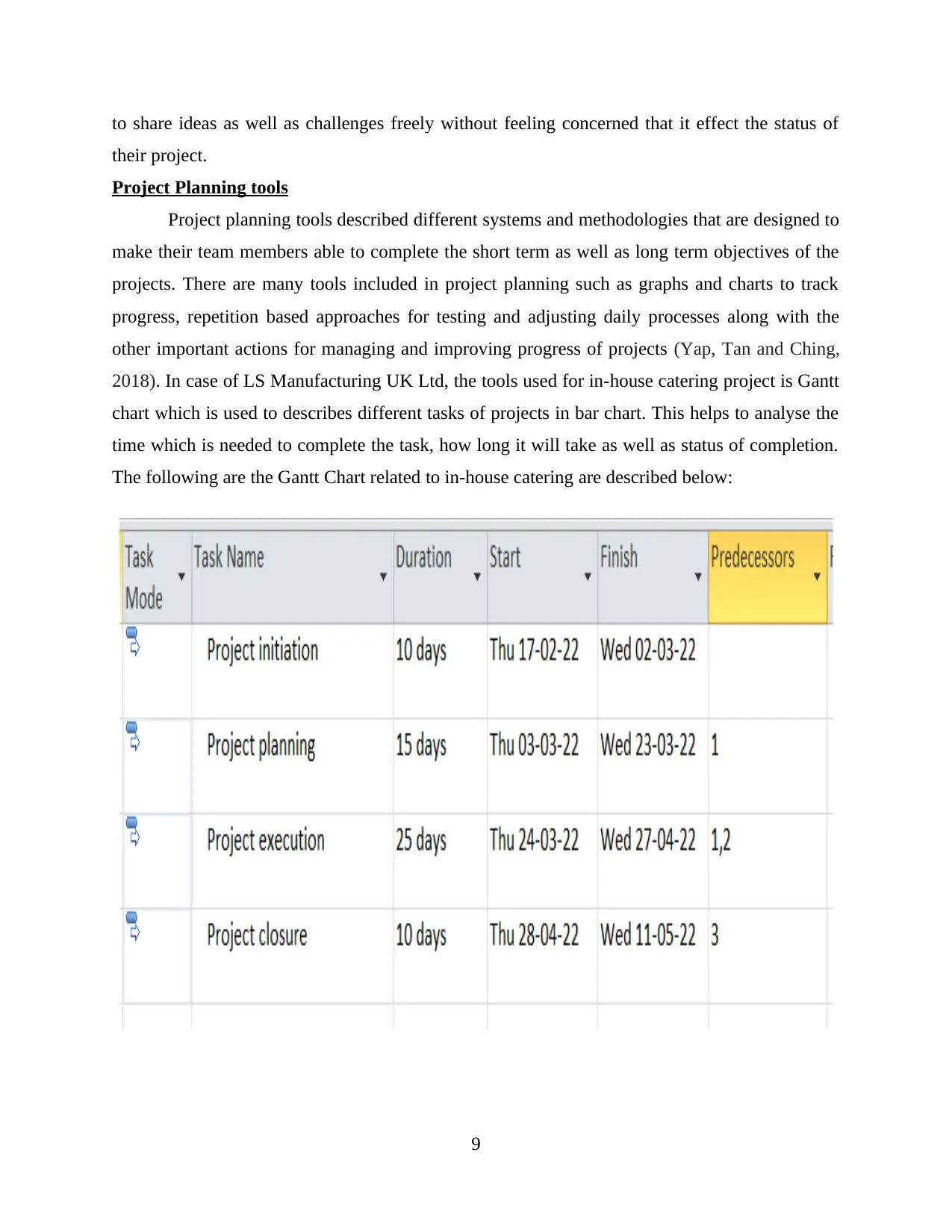
to share ideas as well as challenges freely without feeling concerned that it effect the status of
their project.
Project Planning tools
Project planning tools described different systems and methodologies that are designed to
make their team members able to complete the short term as well as long term objectives of the
projects. There are many tools included in project planning such as graphs and charts to track
progress, repetition based approaches for testing and adjusting daily processes along with the
other important actions for managing and improving progress of projects (Yap, Tan and Ching,
2018). In case of LS Manufacturing UK Ltd, the tools used for in-house catering project is Gantt
chart which is used to describes different tasks of projects in bar chart. This helps to analyse the
time which is needed to complete the task, how long it will take as well as status of completion.
The following are the Gantt Chart related to in-house catering are described below:
9
their project.
Project Planning tools
Project planning tools described different systems and methodologies that are designed to
make their team members able to complete the short term as well as long term objectives of the
projects. There are many tools included in project planning such as graphs and charts to track
progress, repetition based approaches for testing and adjusting daily processes along with the
other important actions for managing and improving progress of projects (Yap, Tan and Ching,
2018). In case of LS Manufacturing UK Ltd, the tools used for in-house catering project is Gantt
chart which is used to describes different tasks of projects in bar chart. This helps to analyse the
time which is needed to complete the task, how long it will take as well as status of completion.
The following are the Gantt Chart related to in-house catering are described below:
9
⊘ This is a preview!⊘
Do you want full access?
Subscribe today to unlock all pages.

Trusted by 1+ million students worldwide
1 out of 17
Related Documents
Your All-in-One AI-Powered Toolkit for Academic Success.
+13062052269
info@desklib.com
Available 24*7 on WhatsApp / Email
![[object Object]](/_next/static/media/star-bottom.7253800d.svg)
Unlock your academic potential
Copyright © 2020–2026 A2Z Services. All Rights Reserved. Developed and managed by ZUCOL.



